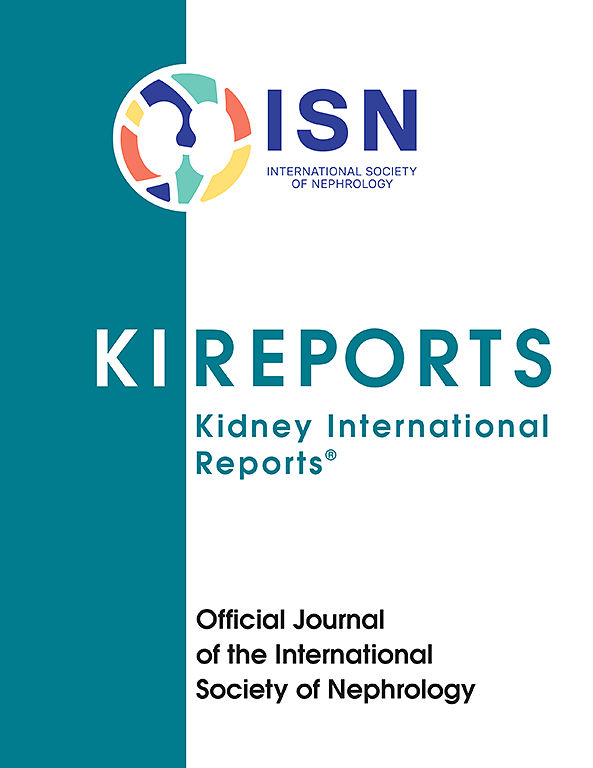Inducing Oxalobacter formigenes Colonization Reduces Urinary Oxalate in Healthy Adults
IF 5.7
2区 医学
Q1 UROLOGY & NEPHROLOGY
引用次数: 0
Abstract
Introduction
Oxalate-degrading intestinal bacteria, including the oxalate-degrading specialist, Oxalobacter formigenes (O formigenes), have the potential to reduce urinary oxalate excretion in humans, and thus limit the risk of calcium oxalate kidney stone formation. The aim of this proof-of-concept study, which was performed in healthy adults, was to demonstrate that ingestion of live O formigenes is safe, can establish sustainable gut colonization, and reduce urinary oxalate excretion.
Methods
Twenty-two healthy adults without a history of kidney stones and not colonized with O formigenes ingested diets controlled in oxalate and calcium. In these participants, 24-hour urine and stool oxalate levels were quantified using ion chromatography coupled with mass spectrometry before and after ingestion of O formigenes.
Results
All 22 participants were successfully colonized after a single dose of O formigenes (∼1010 cells); 10 remained colonized for at least 1 year. Colonization was lost in 11 participants, of whom 9 reported antibiotic use. Six participants who lost colonization were redosed, and 5 were successfully recolonized. Stool oxalate concentration and urine oxalate excretion significantly decreased by 54% and 14%, respectively, with varied responses after colonization. Microbiome molecular analyses of precolonized stool samples highlighted the abundance and diversity of other potential oxalate-degrading bacteria, which may have influenced the effect of O formigenes colonization on urinary oxalate excretion.
Conclusion
These findings support future investigations to examine the effectiveness of O formigenes colonization in reducing urinary oxalate excretion in disease cohorts, including calcium oxalate kidney stone formers with enteric hyperoxaluria.

诱导formigenes草酸杆菌定植减少健康成人尿草酸盐
草酸降解肠道细菌,包括草酸降解专家formigenes草酸杆菌(O formigenes),具有减少人类尿中草酸排泄的潜力,从而限制草酸钙肾结石形成的风险。这项概念验证性研究的目的是在健康成人中进行,目的是证明摄入活的O formigenes是安全的,可以建立可持续的肠道定植,并减少尿草酸盐排泄。方法选取22例无肾结石病史且无O型formigenes定植的健康成人,摄入控制草酸盐和钙含量的饮食。在这些参与者中,在摄入O formigenes之前和之后,使用离子色谱联用质谱法对24小时尿液和粪便草酸盐水平进行量化。结果所有22名参与者在单剂量O formigenes(~ 1010个细胞)后均成功定植;10只至少被殖民了1年。11名参与者失去了定植,其中9人报告使用了抗生素。6名失去殖民化的参与者被重新安置,5名成功重新安置。定植后,粪便草酸浓度和尿液草酸排泄量分别显著降低54%和14%,并有不同的反应。预定植粪便样本的微生物组分子分析强调了其他潜在的草酸降解细菌的丰度和多样性,这可能影响O formigenes定植对尿草酸排泄的影响。这些发现支持了未来的研究,以检验O formigenes定殖在疾病队列中减少尿草酸盐排泄的有效性,包括草酸钙肾结石合并肠源性高草酸尿症。
本文章由计算机程序翻译,如有差异,请以英文原文为准。
求助全文
约1分钟内获得全文
求助全文
来源期刊

Kidney International Reports
Medicine-Nephrology
CiteScore
7.70
自引率
3.30%
发文量
1578
审稿时长
8 weeks
期刊介绍:
Kidney International Reports, an official journal of the International Society of Nephrology, is a peer-reviewed, open access journal devoted to the publication of leading research and developments related to kidney disease. With the primary aim of contributing to improved care of patients with kidney disease, the journal will publish original clinical and select translational articles and educational content related to the pathogenesis, evaluation and management of acute and chronic kidney disease, end stage renal disease (including transplantation), acid-base, fluid and electrolyte disturbances and hypertension. Of particular interest are submissions related to clinical trials, epidemiology, systematic reviews (including meta-analyses) and outcomes research. The journal will also provide a platform for wider dissemination of national and regional guidelines as well as consensus meeting reports.
 求助内容:
求助内容: 应助结果提醒方式:
应助结果提醒方式:


